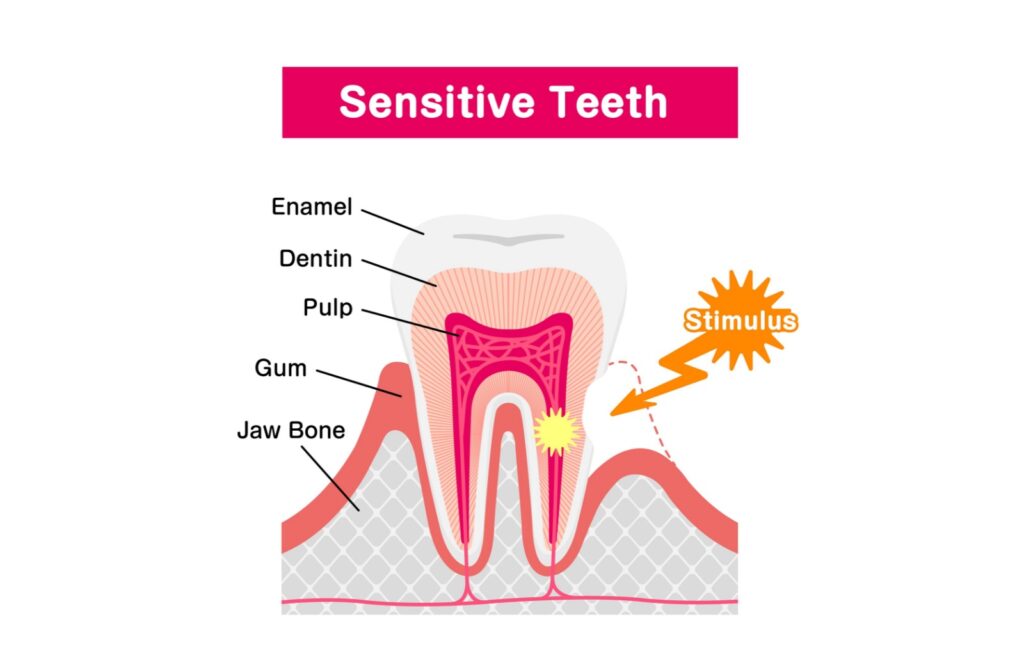A sip of hot coffee or a spoonful of ice cream shouldn’t make you wince. If you suddenly feel a sharp twinge in your teeth, you may be experiencing tooth sensitivity. This common issue can signal changes in your oral health that deserve attention.
This feeling can be unsettling, especially when it appears without warning. Sudden tooth sensitivity often happens because the protective layers of your teeth have worn down, exposing the more delicate parts underneath. Understanding the reasons behind this discomfort is the first step toward finding effective relief for you and your family.
A Look at Tooth Sensitivity
Tooth sensitivity happens when your teeth react to everyday triggers like hot, cold, sweet, or acidic foods and drinks. For some, it’s a quick twinge; for others, it can feel more intense.
The discomfort happens when the protective outer layer of your teeth, called enamel, wears thin. It can also occur if your gums pull back from your teeth. This exposes the layer beneath the enamel, called dentin, which is much more sensitive.
Common Reasons for Sudden Tooth Pain
Worn Tooth Enamel
Your enamel acts as a hard, protective shell for each tooth. When it wears away, it can leave the sensitive layer underneath exposed. This can make your teeth react to temperature changes or certain foods.
Several habits and conditions can cause enamel to wear down over time. It is helpful for your family to be aware of these common factors.
- Brush your teeth too hard
- Consume acidic foods & drinks often
- Grind your teeth, especially at night
And it’s not just sugar and acid that weaken enamel. Dry mouth and frequent snacking can also make your teeth more vulnerable to both sensitivity and cavities.
Receded Gums
Your gums can sometimes pull away from your teeth, a process known as recession. This exposes the roots, which do not have a protective enamel layer. These exposed roots can be very sensitive to hot, cold, or sweet things.
Gum recession can develop from gum disease, aggressive brushing, or even genetics. Regular check-ups with your Ottawa dentist help catch early changes, and professional teeth cleanings reduce plaque buildup that can irritate the gums.
A Cracked Tooth or Filling
Even a tiny crack in a tooth can cause sensitivity. The crack allows outside temperatures and foods to get closer to the nerve inside your tooth. You might not even be able to see the crack with your own eyes.
Old fillings can also wear out or develop small fractures over time. If a filling is no longer sealed properly, it can lead to discomfort. A dental visit can identify if a crack or a faulty dental restoration is the source of the pain.
Simple Tips for At-Home Relief
Choose a Different Toothpaste
You can find toothpastes made specifically for sensitive teeth at most stores. These products contain compounds that can help block the sensations from reaching the nerve. Consistent use over a few weeks can often reduce your discomfort.
Use a Soft-Bristled Brush
Brushing with hard bristles can contribute to both enamel wear and gum recession. A soft-bristled toothbrush is much gentler on your teeth and gums. Remember to brush gently in circular motions instead of scrubbing back and forth.
Watch Your Diet
Very hot, cold, sweet, or acidic foods and drinks are common triggers for sensitivity. You might find relief by limiting these items for a while. This can give your teeth a break as you explore the cause of the sensitivity with your dental team.
While you’re avoiding triggers, consider adding enamel-friendly foods to your diet. Cheese, leafy greens, and nuts are examples of tooth-strengthening options that naturally protect your smile.

Professional Solutions & Treatments
The first step in treating tooth sensitivity is understanding what’s causing it. During a dental exam and cleaning, your dentist can check for enamel wear, gum recession, or other concerns. Pinpointing the source of the sensitivity helps guide the most effective treatment for lasting relief.
Fluoride & Fillings
Fluoride can strengthen tooth enamel, making it more resistant to wear and reducing sensitivity. If exposed roots or worn spots are causing discomfort, your dentist may recommend bonding or a new filling. These treatments place a protective layer over the sensitive area, helping shield it from triggers like heat, cold, or sweets.
Correct Your Bite & Alignment
Crooked or crowded teeth are harder to clean, which can lead to gum problems and sensitivity. Straightening your bite with braces or Invisalign® not only improves the look of your smile, but also makes brushing and flossing more effective — reducing the risk of sensitivity over time.
Restore Your Smile
In some situations, sensitivity comes from more extensive damage or wear. If enamel is severely worn, veneers can restore both protection and appearance, giving your tooth a fresh surface that shields against sensitivity.
When a tooth is too damaged to save, dental implants offer a long-lasting replacement that looks and feels natural. These solutions not only relieve discomfort but also help you smile with confidence again.
Protect Your Family’s Smiles for the Future
Establish Good Habits
Consistent oral hygiene is the foundation of a healthy smile. Teach your family to brush for two minutes, twice a day, and to floss daily. These simple habits can help prevent many of the issues that lead to sensitivity.
Remember, protecting your teeth also protects your whole body. Research shows that a healthy mouth supports overall well-being, including heart health, immune strength, and more.
Schedule Regular Visits
Regular dental check-ups are important for everyone in your family. They allow your dental team to spot and address small problems before they become bigger ones. Proactive care is a great way to maintain comfort and health for years to come.
If you or someone in your family is struggling with tooth sensitivity, don’t ignore the discomfort. The team at Fairlawn Dental Centre can help identify the cause and recommend the right treatment.
Book an appointment today to protect your smile and enjoy everyday comfort again.










